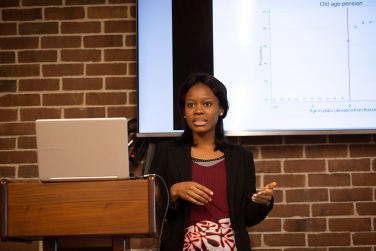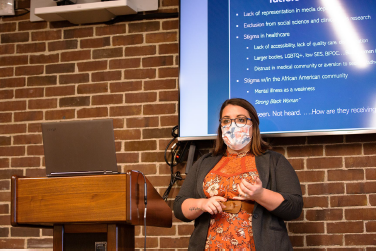Africana Studies Institute 2022, Call for Graduate and Undergraduate Proposals
Project Funding for the Collaborative to Advance Equity through Research on Women and Girls of Color
In November 2015, the White House Council on Women and Girls announced a new initiative on women and girls of color – the Collaborative to Advance Equity through Research on Women and Girls of Color—during a summit co-hosted by the Anna Julia Cooper Center at Wake Forest University. The Collaborative to Advance Equity through Research on Women and Girls of Color, which the University of Connecticut joined in 2015, consists of more than fifty colleges, universities and non-profit organizations committed to studying and addressing the educational, health and social services disparities faced by women and girls of color. Housed within the Africana Studies Institute, UConn’s Collaborative aligns with Africana’s goals to prioritize research and collaboration that target health disparities and injustice and the health and well-being of populations both racialized and gendered. We now seek relevant proposals from undergraduate, graduate, and student-faculty collaborators to conduct research during 2022.

(Bri Diaz)
In line with the goals of the Africana Studies Institute and the national Collaborative, research projects must focus on issues of social and health disparities among women and girls of color, including but not limited to mental health; education, environmental health; maternal, fetal, and infant health from conception to delivery and beyond. Works that investigate the impacts of the ongoing global pandemic (such as the economic burden and toll of disease; inequalities in the way we organize and reward care; and the role of public policy in combating health crises that affect women and girls of color) are also encouraged. We solicit community outreach/field-based research; work with data and/or archival documents, digital research and/or analysis. Awardees will present their research at a symposium subsequent to the award period for research on women and girls of color. The symposium is a site of intellectual exchange among awardees and invited faculty.
Graduate Student Applications
Successful proposals must have the following components that together articulate the project. Graduate student applications are limited to a maximum of 700 words, single-spaced, at least 12pt font, with a clear rationale and/or purpose, methods, theories, scholarly questions, goals, intended audience, timeline for the work facilitated by the award, and expected scholarly outcomes of the research.
Undergraduate Student Applications
Undergraduates will complete the attached form, which seeks information similar to the graduate students’ proposals as well as promotes undergraduates’ experience in preparing strong funding applications.

For consideration any proposal (graduate or undergraduate) must include the following support documents:
*1 and no more than 2 letter(s) of recommendation (by an advisor, instructor, faculty collaborator, etc. that speaks to the student’s research experience, preparation to conduct the research, and importance of the funds to complete the proposed project)
*Statement of general prior research experience (no more than 500 words)
*A current, short CV (no more than 2 pages)
*1-2 pg. budget with lines for listing costs of travel, accommodations, reproduction, institutional access, etc.
All proposals will be subject to a preliminary vetting process by a preliminary review board within the Africana Studies Institute to determine basic project eligibility, suitability, conceptualization, applicant preparedness, and general appropriateness for funding. Proposals successful at this stage then undergo qualitative review by the CLAS Dean’s Office. Those that receive a positive evaluation at this level will be ranked and funds awarded up to total funds available for this cycle. Priority is given to proposals from graduate and advanced undergraduate students. Collaborations between a faculty member and a student are eligible for funding as well. Proposals that clearly envisage a publication or other form of community dissemination, or a larger external research grant proposal also will receive priority evaluation.
Application submission deadline is January 21, 2022, with awards decided on or before February 14, 2022 (funds can be used anytime during 2022). Submit proposals to Amanda Cannada, Program Assistant for ASI: Amanda.Cannada@uconn.edu or the Application submission form. Questions should be posed to Africana Studies Institute director Dr. Melina Pappademos (melina.pappademos@uconn.edu.)